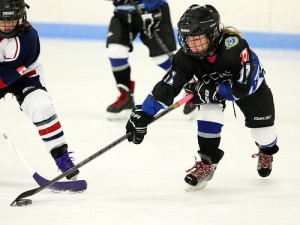New City of Ottawa rules aimed at concussion injury and brain injury prevention
injury and brain injury prevention
Safety rules on the City of Ottawa indoor rinks became a little stricter with the introduction of a new helmet policy. Effective February 1, 2021 kids 10 and under must wear a Canadian Standards Association (CSA) approved hockey helmet. Brain injury prevention is important and bike and ski helmets will no longer be allowed.
Kelly Bean, who helped come up with the city’s new helmet policy, said helmets designed for other sports don’t offer proper protection from falls on ice. A different helmet protects your head in different ways for different types of falls,” she said.
Hockey helmets are designed to withstand multiple impacts, so skaters can keep wearing them even after falling and knocking their head on the ice. Bike helmets must be replaced after a single impact.
“You typically fall a lot more on the ice than you would off of a bicycle,” she said. “The goal behind this campaign is to ensure everyone is safe.”
A properly fitted helmet will absorb the blow from a fall by spreading the impact over the entire helmet and can greatly reduce the risk of serious brain injury. Wearing a helmet can also limit injuries such as skull fractures cuts and bruises, but for it to protect you, it must fit properly and securely and must be the right design for the activity.
There are specific helmets for different activities and each one is designed and tested to protect your head from the impact common to an activity or sport.
What can you do for brain injury prevention?
When buying a helmet, make sure that you are getting the right one for the sport or activity that you intend to participate in. Look for the certification sticker on the inside or outside of the helmet and always try before you buy.
A properly fitting helmet will fit snugly and comfortably. Most come with extra padding that can be added to the inside of the helmet at the front or the back of the helmet so that it fits correctly.
If you are buying a helmet for a growing child, buy one that fits now and not one that they will grow into. If your child is under five, look for a special helmet for toddlers that provides more protection at the back of the head.
Check your child’s helmet at the beginning of every season to see that it still fits properly.
· Put the helmet on so that it is not tilting backward or forward.
· Leave room for one finger between the chinstrap and chin.
· There should be a one-finger distance from the helmet to the eyebrow.
· Have your child shake his head up and down, and side to side. The helmet should stay in place and feel comfortably snug.
· Do not wear a hat under a helmet. It will change the way the helmet fits. A hijab or a thin tuque or balaclava under a hockey is okay. Check the fit and readjust the helmet if needed.
· Baseball hats, big hair clips, and headphones should not be worn under a helmet.
· Ponytails should be low on the neck.
A concussion is a brain injury that can’t be seen on routine X-rays, CT scans, or MRIs. It affects the way a person may think and remember things and can cause a variety of symptoms. Any blow to the head, face, or neck, or a blow to the body that jars your head, could cause a concussion. According to the Journal of Head Trauma Rehabilitation, an average of 150,000 Ontario residents were diagnosed with a concussion each year between 2008 and 2016.
What to do if you suspect a concussion?
In all suspected cases of concussion, the person should stop the activity right away. Continuing increases their risk of more severe, longer-lasting concussion symptoms, as well as increases their risk of other injuries. Anyone with a suspected concussion should be checked out by a medical doctor. If you have questions regarding a brain injury and a personal injury lawsuit, feel free to contact our Ottawa injury lawyers with any questions you may have. We understand, we care, and we’re here to help.
 injury and brain injury prevention
injury and brain injury prevention

